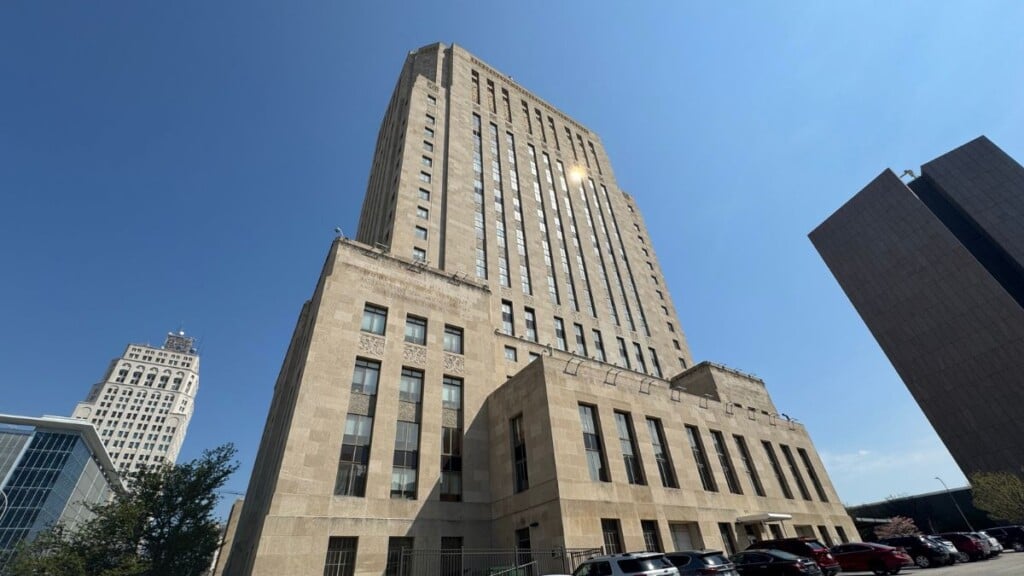KC’s government promised to welcome refugees and asylum seekers. Here’s the underreported struggle of finding housing

Kansas City Mayor Quinton Lucas testifies in an April 10 hearing of the U.S. Senate Committee on Banking, Housing and Urban Affairs. Missouri lawmakers are targeting Kansas City for sanctions over Lucas’s recent remarks welcoming immigrants able to work legally (Screenshot from U.S. Senate stream).
As an influx of people is coming into the country for various reasons, it is apparent that the general public is misinformed on how much assistance immigrants, refugees, and asylum seekers receive during their housing search.
Currently, cities like Chicago and Los Angeles have been flooded with new migrants, but are currently incapable of accommodating them all, according to a news article by the Kansas City Star.
Because of this, the mayor of Kansas City has appeared to be open to welcoming these migrants into our city. While many in the public believe that migrants are given free handouts, such as better housing opportunities, this is nowhere near the reality. In fact, according to a page on MC Law Group, LLC’s website, one of the biggest difficulties for migrants is “securing safe and affordable housing…particularly when they are unable to speak the language and obtain very low-paying jobs.”
It is now more crucial than ever to have a properly informed Kansas City, in order to be able to welcome these newcomers with open arms and help them in finding adequate housing to start their new lives
In regard to many asylum seekers who are currently migrating into the country, they are often thrown in shelters with terrible conditions—overcrowding, the spread of illness, and bad food—for months on end because of their inability to get housing, as reported in a CBS News article.
Asylum seekers are also not able to stay at these shelters indefinitely. For example, in Chicago, according to another CBS article, the city executes a 60-day shelter stay policy, which requires asylum seekers to be reprocessed if they want to re-enter the shelter after those 60 days. This has led to almost 1,000 individuals being forced to exit the shelter system.
In terms of federal housing assistance, refugees are eligible for the same affordable housing assistance as U.S. citizens, according to the United States Department of Housing and Urban Development. This means that they must go through the same exact system and process. They do not “jump the line” or get any preferential treatment.
Anyone that is eligible or qualifies for housing assistance will be assessed and receive assistance in the order in which they applied. Thus, eligible refugees, just like Americans, might have to wait months or even years in order to get any sort of housing assistance. During such a long wait period, a housing search is still a priority.
While migrants attempt to find more temporary solutions to their housing issues, the search can be very difficult for them. In general, a housing search is stressful, as it involves finding a place with a preferable number of bedrooms and bathrooms, located in a desirable area, and within a reasonable price range. Oftentimes, immigrants have to limit these preferences because they lack job security and funds.
This essentially leads to many migrant families having no choice but to fit an excess amount of people in smaller spaces. This is confirmed in a report by the National Council on Family Relations, where it is stated that immigrant families often face challenges with finding affordable housing and overcrowding, as they typically have less money and larger families.
Additionally, they are often unaware of the safety issues of certain areas or might even be forced to live in unsafe neighborhoods because of their financial limitations. On top of all of this, migrants have limited English and cannot always properly express their needs to a prospective landlord, even if they might have particular preferences that they can afford.
But it does not end there. Say they find a place and finally get the chance to tour it. When they get there, they examine the entire premises and notice some inhabitable or dangerous aspects. For example, perhaps there is exposed wiring and broken outlets, or even mold and pest droppings.
Most Americans would understand that such findings are fire hazards and health safety issues, making it illegal for the landlord to rent out the property. However, a newcomer, perhaps even from a third-world country, is less likely to have knowledge of American laws and might think the conditions are acceptable, especially for the reduced price they are being asked to pay. Because of this, many immigrant families face health and safety hazards. In fact, according to the National Council on Family Relations report, immigrants are “more likely to live in poor or hazardous housing conditions.”
Now say they move on to the application process. Oftentimes migrants are obstructed from obtaining housing due to this process. Every housing provider asks for proof of income information, perhaps by showing three times the monthly rent in the form of recent bank statements or paystubs. This type of proof of income can be challenging for some Americans to provide despite living in the country their whole lives. However, for migrants, it can be even more troublesome to provide considering they may have never worked a day in the country
Despite the fact that these people need housing as soon as possible, securing a job and making a steady income can take time. As finding a job in this country is getting excruciatingly more challenging, it is made even more difficult when an individual has no past work experience in the country and minimal English proficiency.
Nevertheless, even if these migrants have some form of income, most landlords will also ask for credit history information. However, these migrants often have not built any credit, and according to a page on American Express’ website, it can take at least six months to establish a basic credit history.
Regardless, there is no guarantee that the credit they build will be good or pass the standards of the landlord immediately, especially if they have not secured a steady job. Many landlords also ask for rental history verification, but if a migrant has just fled their country, there is no telling whether they have access to these documents any longer.
According to KC Home Rental’s Application Qualification’s page, the failure to provide valid contact information for previous landlords may void rental applications. Even if a refugee or newcomer is able to provide their previous landlords contact information, the language barrier between the prospective landlord and previous landlord may add another level of difficulty to the situation, as the landlord might have trouble deciding whether the prospective tenants are good tenants.
Thus, the difficulties for newcomers during the application process can be intensified versions of the hardships that many Americans also face during the same process.
What if they have completed these steps, and the individual is ready to sign a lease? Many Americans—who have spoken, read, and written in English their whole lives—are still unable to understand leasing agreements.
Such misunderstandings are exacerbated for newcomers to the country who have limited English proficiency. This is because reading and understanding a lease can be extremely difficult, even if translated, which essentially leads to added misconceptions about the rights and responsibilities of each party in the leasing agreement.
Additionally, many Americans who grew up in the American school system and are aware of the laws and ordinances in the country, as well as their respective cities, may still not always be aware of their rights as tenants or the responsibilities of their landlords. This can be worse for migrants who have little to no awareness of the laws in the country, let alone the legalities of housing.
According to the article by MC Law Group, LLC, “migrants are often mistreated, excessively charged, and threatened with eviction by dishonest and negligent landlords.” This is due to their lack of awareness of their rights, as well as their inability to understand when they are permitted to hold their landlords responsible.
Ultimately, migrants often comply with their landlords and continue to be exploited.
All in all, information about immigrants and the “handouts” they allegedly receive are often false at their core. Immigrants do not receive nearly as much assistance finding affordable or sufficient housing as the general public may think they do. Furthermore, they have added difficulties finding housing on their own with their various limitations.
Luckily, there are organizations that assist them in at least getting an equal footing, providing them with translators, teaching money management courses, putting on workshops for home-ownership, helping with job placements, and more.
If you would like to help volunteer or donate with organizations that can provide such services, especially with the likelihood of more migrants moving to the city, you can contact KC for Refugees, RefugeKC, and Della Lamb.




